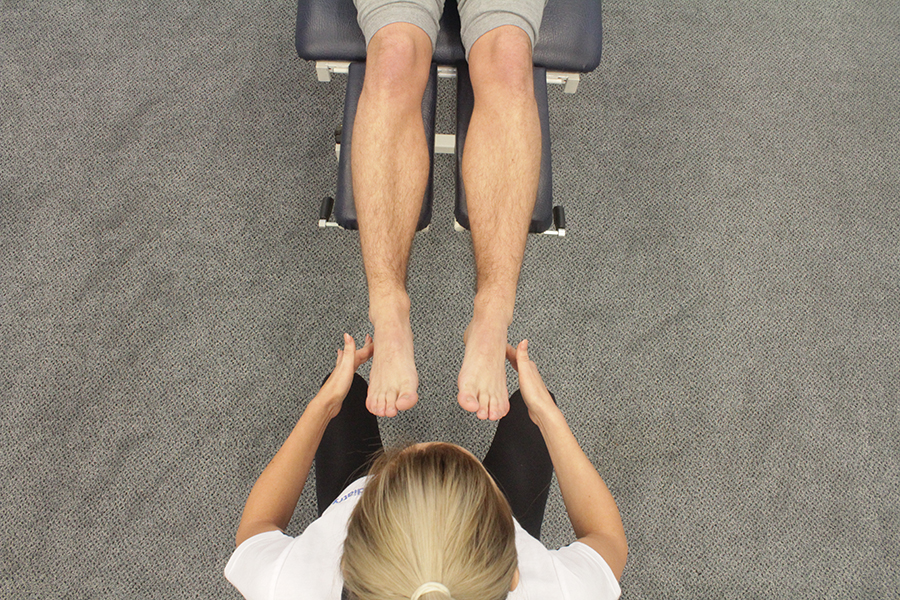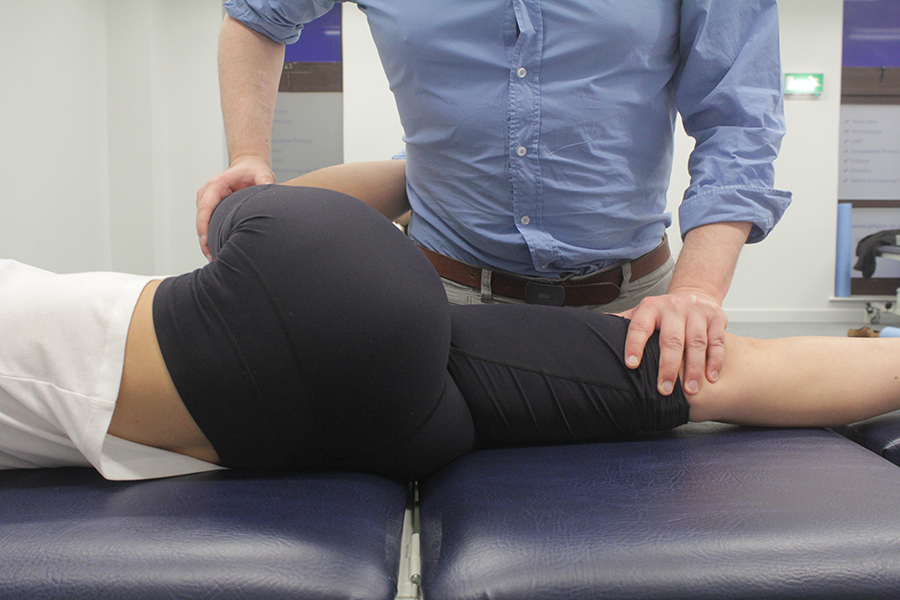Hip pain
Hip pain describes pain that is felt either at, or around the hip joint. Hip pain can be either acute (the result of sudden trauma) or chronic (due to an on-going problem). The following section refers to chronic hip pain only.
Hip pain presents as pain or discomfort at, or around the site of the hip joint. The hip joint is where the thigh bone (femur) connects to the pelvis. The hip joint is what is known as a 'ball and socket' joint, this is because the head of the femur is round like a ball, and this sits in a hollowed out space in the pelvis called the acetabulum ' just like a ball in a socket. The hip joint is held in place by ligaments (ligaments connect bones to other bones), which are surrounded and supported by a variety of muscles and tendons, all of which can be subject to injury.
Hip pain is typically a chronic complaint, this means that the condition has been there for a while and is not the result of a sudden trauma. The majority of hip pain is chronic and is typically the result of overuse or poor mechanics (the alignment and function of the body). Hip pain can therefore be the result of either:

Hip pain has a number of contributing factors, for example:
The signs and symptoms of hip pain may include:
There are a variety of types of hip pain, the most common conditions include:
Trochanteric Bursitis
Trochanteric bursitis is inflammation of the bursa that overlies the greater trochanter. The greater trochanter is the bony bit of the thigh bone (femur) on the outside of the hip. A bursa is a fluid filled sac of fluid that helps the muscles and tendons glide smoothly, it therefore reduces friction. Trochanteric bursitis produces pain on the outside of the hip.
Tendonitis
Tendonitis of the hip involves inflammation of two muscles; iliopsoas and illiacus, which collectively are known as iliopsoas. Iliopsoas attaches to the top of the thigh bone (femur) at the lesser trochanter, which is on the inside of the thigh bone, opposite the greater trochanter. Ilipsoas is responsible for the following actions:
Capsulitis describes a condition in which the joint capsule becomes irritated and inflamed. The joint capsule is a network of ligaments that surround a joint and provide stability. When the joint capsule becomes inflamed the amount of movement available at the hip joint is restricted, particularly flexion and turning the hip outwards. Capsulitis therefore produces both pain and stiffness at the hip joint.

One of our podiatrists at Chiropody.co.uk will diagnose the cause of your hip pain based on a thorough history, the signs and symptoms, as well as an examination and a biomechanical assessment.
If you have hip pain podiatry assessment and treatment can benefit you. Podiatric benefits include:
Podiatry for hip pain would involve the following:
Hip pain describes any pain felt around the hip area. Hip pain can be either acute (as a result of a sudden trauma) or chronic (as part of an on-going condition). Typically hip pain is a chronic complaint and is the result of inflammation, degeneration, or injury.
Hip pain can be the result of poor foot and lower limb mechanics, a leg length difference, overuse, or as a result of too much pressure being placed on the area.
If you think that your hip pain could be caused by any of these then please visit Chiropody.co.uk who will be happy to help.
To arrange an assessment with one our podiatrists please email office@chiropody.co.uk or call 0330 088 4222.
What is hip pain?
Hip pain presents as pain or discomfort at, or around the site of the hip joint. The hip joint is where the thigh bone (femur) connects to the pelvis. The hip joint is what is known as a 'ball and socket' joint, this is because the head of the femur is round like a ball, and this sits in a hollowed out space in the pelvis called the acetabulum ' just like a ball in a socket. The hip joint is held in place by ligaments (ligaments connect bones to other bones), which are surrounded and supported by a variety of muscles and tendons, all of which can be subject to injury.
Hip pain is typically a chronic complaint, this means that the condition has been there for a while and is not the result of a sudden trauma. The majority of hip pain is chronic and is typically the result of overuse or poor mechanics (the alignment and function of the body). Hip pain can therefore be the result of either:
- Inflammation
- Injury
- Degeneration (weakening)

What causes hip pain?
Hip pain has a number of contributing factors, for example:
- Poor foot and lower limb mechanics (e.g. over-pronation):
- The reason that poor foot and lower limb mechanics can lead to pain at the hip is because the feet are our body's foundations; they support the entire body. If the feet are not functioning correctly then this can have an effect on other joints in the body, which collectively form a kinetic chain. A kinetic chain means that the bones and muscles are all connected and work together to produce movement. If the kinetic chain is not functioning as it should then muscles, tendons, ligaments, and bones can be knocked out of alignment, and this can cause inflammation and pain. Other causes of hip pain include:
- Leg length difference
- Overuse/repetitive movements
- Pressure
What are the signs and symptoms of hip pain?
The signs and symptoms of hip pain may include:
- Pain
- Discomfort
- Swelling
- A limp
- Restricted movement at the hip
Types of hip pain
There are a variety of types of hip pain, the most common conditions include:
Trochanteric Bursitis
Trochanteric bursitis is inflammation of the bursa that overlies the greater trochanter. The greater trochanter is the bony bit of the thigh bone (femur) on the outside of the hip. A bursa is a fluid filled sac of fluid that helps the muscles and tendons glide smoothly, it therefore reduces friction. Trochanteric bursitis produces pain on the outside of the hip.
Tendonitis
Tendonitis of the hip involves inflammation of two muscles; iliopsoas and illiacus, which collectively are known as iliopsoas. Iliopsoas attaches to the top of the thigh bone (femur) at the lesser trochanter, which is on the inside of the thigh bone, opposite the greater trochanter. Ilipsoas is responsible for the following actions:
- Hip flexion (lifting the leg towards the upper body)
- Some lateral hip rotation (turning the hip outwards)
- Some rotation of the spine
Capsulitis
Capsulitis describes a condition in which the joint capsule becomes irritated and inflamed. The joint capsule is a network of ligaments that surround a joint and provide stability. When the joint capsule becomes inflamed the amount of movement available at the hip joint is restricted, particularly flexion and turning the hip outwards. Capsulitis therefore produces both pain and stiffness at the hip joint.

How is hip pain diagnosed?
One of our podiatrists at Chiropody.co.uk will diagnose the cause of your hip pain based on a thorough history, the signs and symptoms, as well as an examination and a biomechanical assessment.
Benefits of podiatry for hip pain
If you have hip pain podiatry assessment and treatment can benefit you. Podiatric benefits include:
- Reduction in pain and inflammation
- Improvement in lower limb mechanics
- Improved gait
- Future injury prevention
What would podiatry for hip pain involve?
Podiatry for hip pain would involve the following:
- A thorough medical history
- History of the problem
- An examination
- Biomechanical assessment
- Orthoses
- Stretching Programmes
- Strengthening Exercises
- Range of Movement Exercises
- Ultrasound
- Massage
- Footwear review
- Anti-inflammatory advice
Summary
Hip pain describes any pain felt around the hip area. Hip pain can be either acute (as a result of a sudden trauma) or chronic (as part of an on-going condition). Typically hip pain is a chronic complaint and is the result of inflammation, degeneration, or injury.
Hip pain can be the result of poor foot and lower limb mechanics, a leg length difference, overuse, or as a result of too much pressure being placed on the area.
If you think that your hip pain could be caused by any of these then please visit Chiropody.co.uk who will be happy to help.
To arrange an assessment with one our podiatrists please email office@chiropody.co.uk or call 0330 088 4222.
Save 5% by booking an appointment online.

Find your nearest clinic
We have clinics located throughout the North West. We also provide a home visit service.
Find out more »

No waiting lists!
Tired of waiting for treatment? Be seen by a podiatrist today!
Find out more »

Not sure how we can help?
Speak to a podiatrist to find out how we can help. Call us on 0330 088 4222.
Find out more »
We work with:

Individuals

Organisations

Health professionals
Get in Touch!
0330 088 4222
If you would like to speak to one of our specialists then please complete this form.
We are open 7 days a week








